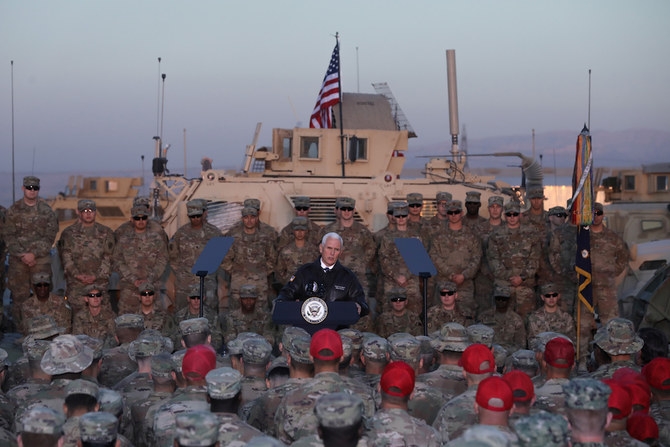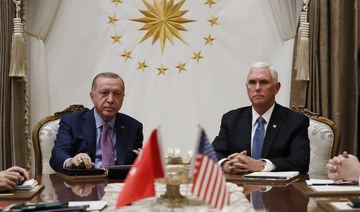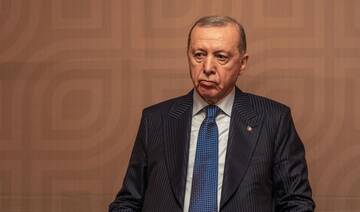IRBIL, Iraq: Vice President Mike Pence worked to reassure the United States’ Kurdish allies in an unannounced trip to Iraq on Saturday, the highest-level American trip since President Donald Trump ordered a pullback of US forces in Syria two months ago.
Flying in a C-17 military cargo jet to preserve the secrecy of the visit, Pence landed in Irbil to meet with Iraqi Kurdistan President Nechirvan Barzani. The visit was meant to hearten the United States’ regional partners in the fight against the Daesh group after the US pulled troops from northern Syria, leaving the Kurdish allies in neighboring Syria to face a bloody Turkish assault last month following the Trump-ordered withdrawal.
Earlier, Pence received a classified briefing at Iraq’s Al-Asad Air Base, from which US forces are believed to have launched the operation in Syria last month that resulted in the death of Daesh leader Abu Bakr Al-Baghdadi. Pence also spoke by phone with Iraqi Prime Minister Adel Abdul Mahdi.
It was Pence’s second trip to the region in five weeks. Trump deployed him on a whirlwind trip to Ankara, Turkey, last month to negotiate a cease-fire after President Recep Tayyip Erdogan seized on the US withdrawal to launch the offensive on US-allied Kurdish fighters in northern Syria. Trump’s move had sparked some of the most unified criticism of his administration to date, as lawmakers in both parties accused Trump of forsaking longtime Kurdish allies and inviting Russia and Iran to hold even greater sway in the volatile region.
Pence said he welcomes “the opportunity on behalf of President Donald Trump to reiterate the strong bonds forged in the fires of war between the people of the United States and the Kurdish people across this region.”
Asked if the United States was facing a sense of betrayal from Iraqi and Syrian Kurdish allies over Trump’s actions in Syria, Pence said both groups, including Syrian Kurdish forces “who fought alongside us,” had no doubts about the US commitment to them. “It’s unchanging,” Pence said.
A senior US official said Pence’s visit was also meant to reassure the many Americans who have long supported the region’s Kurds that the Trump administration remained committed to the alliance. The visit was also designed to show Pence’s focus on foreign policy as Washington is gripped by the drama of impeachment.
When the US forces withdrew, Syria’s Kurds — seeking protection from their No. 1 enemy, Turkey — invited Syrian government and Russian forces into parts of northeastern Syria where they had not set foot in years. More are now deploying along large parts of the border region under a Russian-Turkish deal, including to at least one former US garrison in northern Syria.
The Ankara agreement required Syrian Kurds to vacate a swath of territory in Syria along the Turkish border in an arrangement that largely solidified Turkey’s position and aims.
Pence hailed the cease-fire as the way to end the bloodshed caused by Turkey’s invasion. The deal includes a halt to American economic sanctions and no apparent long-term consequences for Turkey for its actions.
The Syrian-led Kurdish forces say the cease-fire is persistently violated and fighting raged Saturday between them and Turkey-backed forces outside the Syrian town of Ein Issa, once home to US bases and the Kurdish administration.
A senior Syrian Kurdish official agreed on Saturday that the relationship remains unchanged, but was critical of Washington’s lack of response to Turkey’s violations of the cease-fire.
Limiting the US partnership to military cooperation over a limited area with the Syrian Kurdish fighters, “while condoning the killing of civilians, is not a very honest relationship and cooperation,” the official, Ilham Ahmed, said.
On Nov. 13, Trump feted Erdogan with a White House visit over the objection of a bipartisan group of lawmakers who argued Erdogan should be denied the honor of a West Wing visit in the aftermath of the invasion and because of his decision to purchase Russian-made surface-to-air missiles over the objection of NATO allies.
Barzani thanked Pence for the US military support in the fight against the Daesh group, adding that his “visit at this particular time is an important indication of your continued support to Kurdistan and Iraq.”
The US collaboration with the Iraqi Kurds has not changed in the wake of US withdrawal from northern Syria. In neighboring Syria, after declaring the near-complete withdrawal of US forces from Syria, Trump decided that roughly 800 would stay to keep eastern Syria’s oil fields from falling back into the hands of Daesh.
Just years ago, the militant group seized control of vast stretches of Syria and Iraq, with its extremist ideology spreading from its self-declared “caliphate” across the globe. In March, American troops and Syrian Kurdish forces routed the last Daesh territorial holdings. But the militant group, which arose from the remnants of Al-Qaeda in Iraq after that group’s defeat by US-led forces in 2008, has ambitions to regenerate again. And it remains a dangerous threat in Iraq, Syria, Afghanistan and beyond.
Trump also agreed to keep about 150 US troops at a base in southern Syria as a check on Iranian influence in the region.
While Trump has claimed that the US was now “keeping” the oil in Syria, Pentagon officials indicated the US presence is not intended to improve the oil infrastructure but to keep it in the hands of the Kurdish-led Syrian Democratic Forces.
Pence, joined on the trip by his wife, Karen Pence, also greeted US troops ahead of the Thanksgiving holiday, serving turkey and accompaniments to hundreds of troops at the two locations.
“While you come from the rest of us, you’re the best of us,” Pence told service members in a dusty hangar at Al-Asad. He said the Trump administration is working to secure another pay increase for the armed services and suggested the ongoing impeachment inquiry in Washington was slowing the way.
“Partisan politics and endless investigations have slowed things down in D.C.,” Pence said.
Pence’s visit to Iraq comes as the country has been plagued by widespread anti-corruption protests. At least 320 protesters have been killed and thousands have been wounded since the unrest began on Oct. 1, when demonstrators took to the streets in Baghdad and across Iraq’s mainly Shiite south to decry rampant government malfeasance and a lack of basic services despite Iraq’s oil wealth. The protests have exposed long-simmering resentment at Iran’s influence in the country, with protesters targeting Shiite political parties and militias with close ties to Tehran.
Pence spoke by phone with Abdul Mahdi after the Iraqi leader declined an invitation to meet with Pence at the air base after security concerns prevented Pence from traveling into Baghdad. US Ambassador to Iraq Matthew Tueller said Pence expressed support for a free, sovereign and independent Iraq — a subtle warning against Iranian influence in the country, which has weakened cooperation between the US and Iraq.
Pence also encouraged the Iraqi government to show restraint with the protesters. According to one official, Abdul Mahdi expressed regret for the violence and cast it as growing pains for the country and its security services, more used to war than democratic protest.
The leaderless, mass protests aim to sweep aside Iraq’s sectarian system imposed after the 2003 US invasion and its political elite, including Abdul Mahdi, blamed for massive corruption.
US officials assess that the protests won’t subside unless Abdul Mahdi’s government makes substantial concessions, potentially up to the resignation of the government and the calling of early elections.
Pence’s visit comes days after the release of hundreds of pages of purported Iranian intelligence documents detailing Iran’s extensive influence in Iraq.
The revelation came after dozens of demonstrators attacked the Iranian consulate in Karbala earlier in November, scaling concrete barriers and saying they rejected the influence of the neighboring country in Iraqi affairs.
“We want to see an Iraq that is free from the malign influence of Iran, and is also respecting the rights and voices of all its people,” Pence said.
On Iraq visit, US VP Pence reassures Kurds and discusses protests with premier
On Iraq visit, US VP Pence reassures Kurds and discusses protests with premier

- The visit was previously unannounced due to for security reasons
- This is Pence’s first visit to Iraq and comes nearly one year since Trump’s surprise visit to the country
Turkiye seals preliminary deals for largest foreign-funded railway project

- The funding will support the 125 km (78 mile) long Northern Ring Railway Project, which will carry passengers and freight from Gebze to Halkali via the Yavuz Sultan Selim Bridge connecting Istanbul’s two main airports
ISTANBUL: Turkiye has reached preliminary agreements with six international lenders to secure $6.75 billion for a new railway line across the Bosphorus in what would be Turkiye’s largest foreign-financed railway project, Transport Minister Abdulkadir Uraloglu said on Tuesday.
Once completed, the line that will pass through north Istanbul is expected to carry 33 million passengers and 30 million tons of freight annually, he said, adding that it will open “a new era in logistics” by boosting the country’s rail capacity between Asia and Europe.
The funding will support the 125 km (78 mile) long Northern Ring Railway Project, which will carry passengers and freight from Gebze to Halkali via the Yavuz Sultan Selim Bridge connecting Istanbul’s two main airports.
Preliminary deals were reached with the World Bank, Asian Infrastructure Investment Bank, Asian Development Bank, Islamic Development Bank, OPEC Fund for International Development and the European Bank for Reconstruction and Development, the minister said.
“We aim to complete the tender process and hand over the site this year so that (construction) work can start,” Uraloglu said.
An uninterrupted rail freight across the Bosphorus Strait is currently possible through the Marmaray railway tunnel and only during limited hours daily. According to the ministry’s website, a total of just 1.7 million tons of cargo were transported through Marmaray between 2020 and October 2025.














